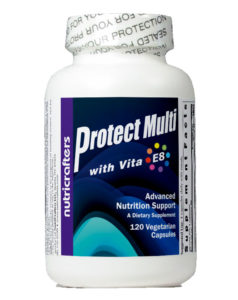Originally identified as a fat-soluble nutrient required for normal blood coagulation, vitamin K is actually a family of similar compounds, which recent research reveals are also necessary for integrating calcium into bone and preventing its deposit within blood vessels. The latest research also indicates vitamin K possesses significant anti-cancer and anti-inflammatory actions.
In nature, vitamin K is found in the forms of vitamin K1 (phylloquinone) and several different types of vitamin K2 (menaquinones):
K1, which is involved in photosynthesis, is produced by plants and algae, its highest concentrations found in green leafy vegetables. Primary dietary sources of K1 are leafy greens, such as broccoli, kale, and Swiss chard, and plant oils, such as canola and soybean oil.
K2 is produced by bacteria and also via the conversion of K1 to K2 by beneficial bacteria in the intestines of animals, including humans. Natto (fermented soybeans) is the richest dietary source of vitamin K2. Dairy products (milk, butter, cottage cheese, cheese) and egg yolk also provide small amounts.
K2 is more potent and has the widest range of activity. Far more active than K1 in both bone formation and reduction of bone loss, K2 is a 15-fold more powerful antioxidant than K1, and is also the form which has been found to protect against arterial calcification and the oxidation (free radical damage) of LDL cholesterol.

Finally, K2 occurs in numerous forms that vary in their activity. K2 can have a side chain between 4 and 9 units long. This side chain has a great effect on bioavailability. Shorter chain length results in shorter half-life within the body, thus limiting our body’s ability to utilize the vitamin. Both vitamin K1 and vitamin K2 in the form of menaquinone-4 have very short half-lives in the body, while longer chain forms of vitamin K2, such as menaquinone-7, have dramatically longer half-lives and much higher bioactivity. Because recent research has shown that vitamin K2, in the form of menaquinone-7, is the most potent and longest acting form of vitamin K2, many researchers now consider it to be the most important dietary form of vitamin K for protecting the cardiovascular system and promoting bone health.
In a massive European clinical trial following 4,807 subjects aged at least 55 over a 7-10 year period, researchers found that K2, but not K1, significantly reduced risk of cardiovascular disease by 57%, death from all causes by 26%, and severe aortic calcification by 52%. K1 provided no significant cardiovascular protection.
Read more about vitamin K in these following articles:
Vitamin K2—Keeps Calcium Out of Your Arteries and In Your Bones
Vitamin K2 is More Important in the Fight Against Osteoporosis than Calcium
